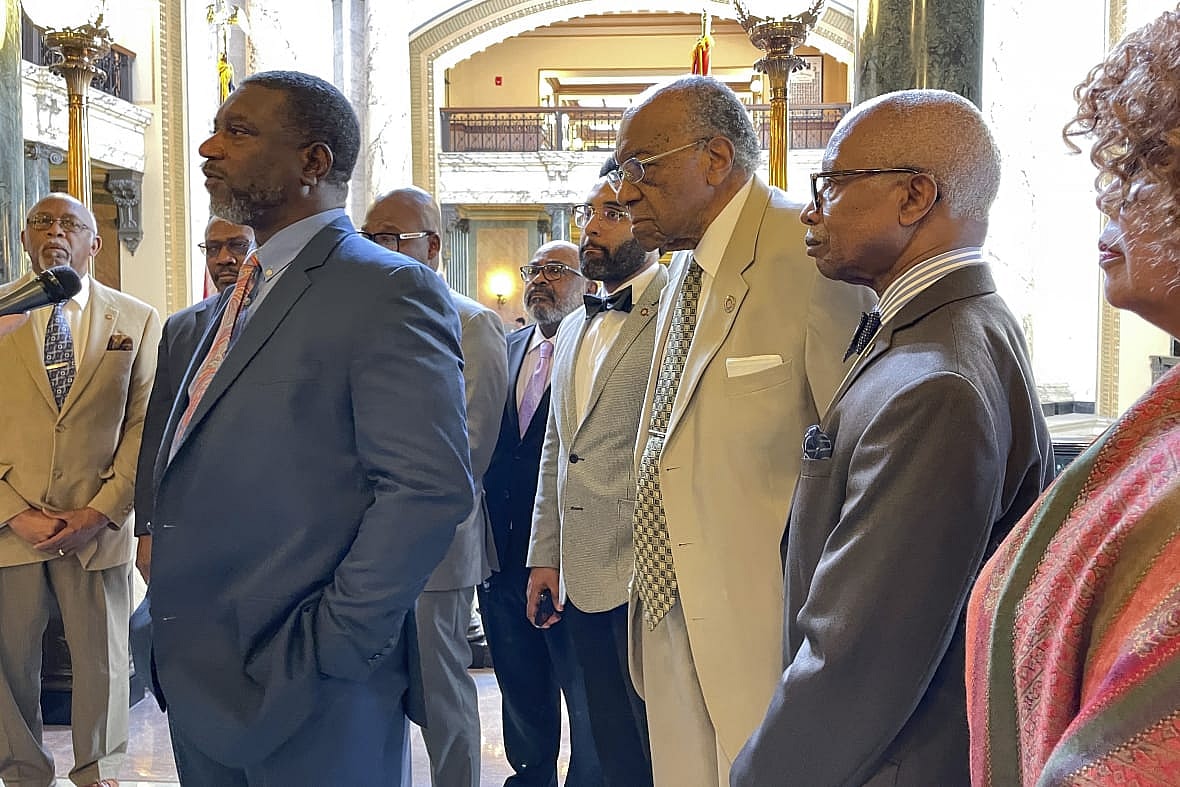JACKSON, Miss. (AP) — Mississippi’s Republican-led Senate voted Wednesday against confirming veteran educator Robert P. Taylor as state superintendent of education, angering some Black Democrats who said the rejection was at least partly because Taylor is Black and wrote years ago about the state’s racist history.
The state Board of Education — which has members chosen by the Republican governor, lieutenant governor and House speaker — conducted a nationwide search for a superintendent last year. Board members announced in November that their unanimous choice was Taylor, who had worked the past 30 years in North Carolina.

“This whole confirmation was a political process, and I knew that coming in,” Taylor told The Associated Press on Wednesday evening after the Senate vote. He said senators in the past have confirmed all previous nominees for state superintendent, and he is disappointed this group of senators did not confirm him.
“The fact that they didn’t, that is what I have to live with,” Taylor said. “I will always respect the process.”
It’s not unusual for nominees to serve while waiting for senators to consider confirmation, and Taylor had been working as superintendent in Mississippi since January. With the Senate’s rejection, the board will search for another superintendent.
About 38% of Mississippi residents are Black. Taylor would have been Mississippi’s second Black state superintendent of education, after Henry Johnson served from 2002 to 2005.
Taylor grew up in Laurel, Mississippi, and earned his bachelor’s degree in 1990 at the University of Southern Mississippi. As an undergraduate, he wrote for a newsletter called “The Unheard Word,” which he said gave Black students a voice that the campus newspaper often ignored.
A 2020 article on the university’s Center for Black Studies website focused on the short-lived newsletter.
“‘The Unheard Word,’ in my opinion, recognized that The University of Southern Mississippi was in the most racist state in the Union, and that while historical focus has always been on the University of Mississippi, Southern Miss had a past that was tainted as well,” Taylor told the Center for Black Studies.
Taylor told AP in a phone interview that it’s important for people to read his words in context. He said the newsletter wrote, for example, about the history of Clyde Kennard, who sought to become the first Black student the university in the 1950s and was rejected because of his race. The Mississippi Sovereignty Commission, a state spy agency at the time, led efforts to block Kennard’s enrollment.
The Senate vote on Taylor’s nomination Wednesday was mostly along party lines, 31 Republicans voting against. Of the 21 who voted for confirmation, five were Republicans and the others were Democrats.
“Because we reject him because of his race, we’re rejecting God because God made him that way,” said Democratic Sen. David Jordan, who is Black.
Republican Sen. Chris Johnson of Hattiesburg, who is white, voted in favor of confirming Taylor. He said Taylor answered senators’ questions in a straightforward manner during a confirmation hearing, including about what he had written about Mississippi’s racist history.
“He answered that by saying, ‘At that time, that’s how I felt,” Johnson told reporters Wednesday after the nomination failed.
The previous Mississippi superintendent of education, Carey Wright, retired on June 30 after 8 1/2 years in the job. An interim superintendent started July 1 and served until Taylor arrived.
Senate Education Committee Chairman Dennis DeBar, a white Republican from Leaksville, said race had nothing to do with his vote against the nomination of Taylor. DeBar said he thinks Taylor is a good man and should be respected.
“I think what really hurt Dr. Taylor the most … is we have several low-performing schools in our state,” DeBar said. “We would like to see someone with a better resume on improving low-performing schools.”
Democratic Sen. Derrick Simmons of Greenville, who is Black, said Taylor should have been confirmed.
“Dr. Taylor did everything that we tell people in the state of Mississippi to do — get a good education, try to use that good education, go out and get your experience and then come back to the state of Mississippi and give Mississippi all of your educational talents and all of your educational experience and give back to the community that gave to you,” Simmons said.
Hours after the Senate rejected Taylor’s nomination, Democratic Sen. Barbara Blackmon of Canton, who is Black, tried to amend other legislation to say Mississippi would only consider nominees who have never left the state — a way of expressing her anger about the rejection. Lt. Gov. Delbert Hosemann said the amendment was not relevant, and senators did not vote on it.
TheGrio is FREE on your TV via Apple TV, Amazon Fire, Roku, and Android TV. Please download theGrio mobile apps today!

